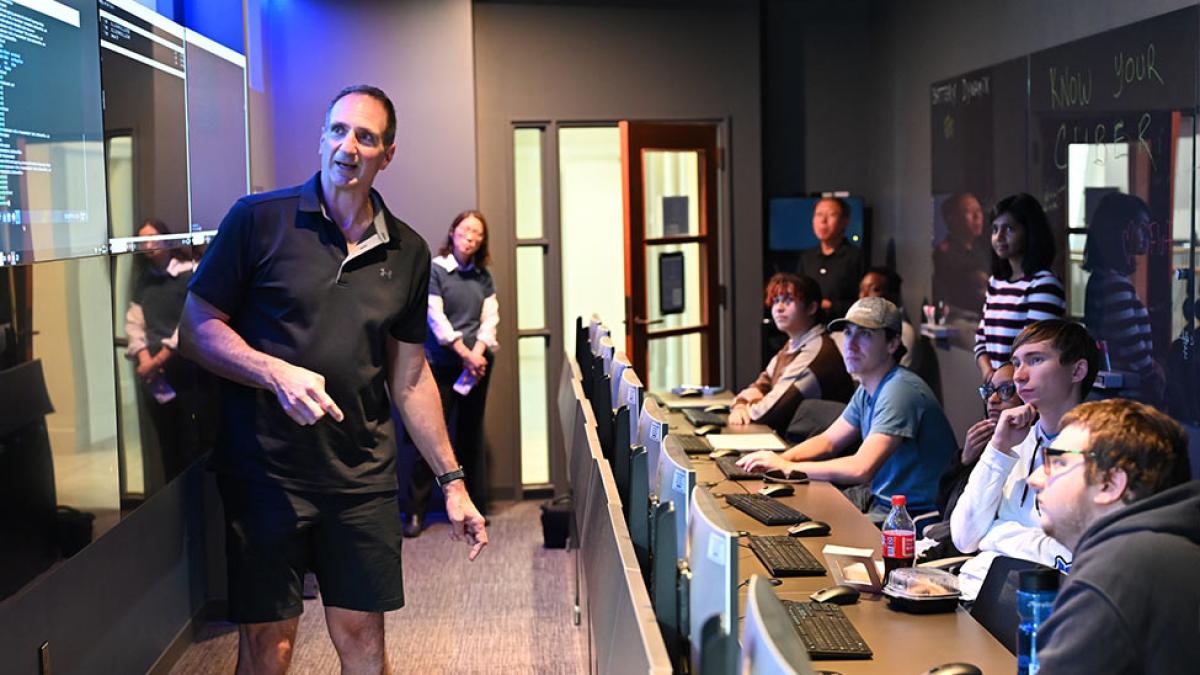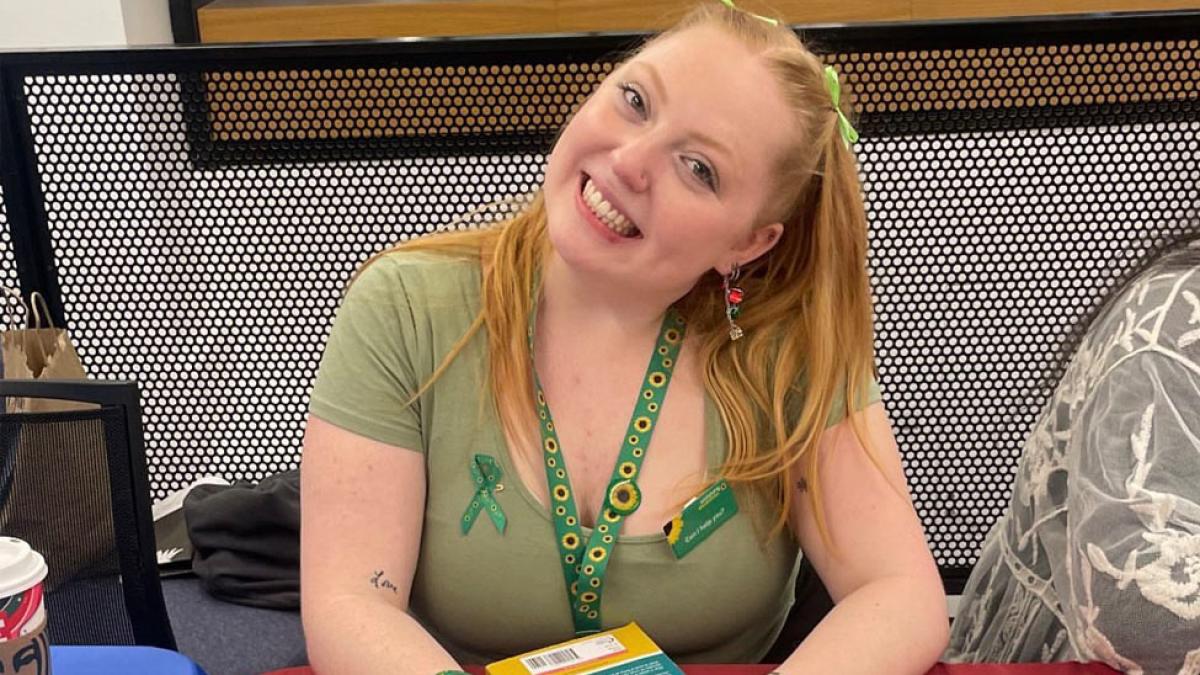Saloni Pasad has taken advantage of everything Seidenberg’s Human Centered Design program has to offer; including working with the NYC Design Factory, earning her a trip to Switzerland to explore how today's technology can provide tomorrow's food.
La Música De La Tonelería
Dyson Professors Maria Luskay and Lou Guarneri are leading Pace University’s documentary film team PaceDocs in filming their latest project on location overseas. They are currently in Spain, and are collaborating with a well-known musician and composer, José Buendía Picó, to provide music.
"Openly Impatient": Experts Say "Angry" Judge Put Trump's Lawyers On Notice In Brutal Hearing
Elisabeth Haub School of Law Professor Bennett Gershman speaks to Salon.com about New York Supreme Court Justice Judge Juan Merchan showing "evident exasperation and scorn" as he scolded Trump's legal team over "misleading" claims.
"Judge Merchan showed yesterday that he is going to administer the trial firmly and fairly and is not going to permit Trump and his lawyers to distract, mislead, or play games," Gershman, a Pace University law professor, told Salon, adding that the judge was "openly impatient and intolerant at the way Trump’s legal team was litigating this case."
Time Is Money: Salon No-Shows Cost Stylists Significant Income
Lubin Professor Larry Chiagouris speaks with Yahoo News about how salon no-shows are costing stylists a significant income.
Legitimacy Still A Vital Challenge In China
Dyson Professor Joseph Tse-Hei Lee writes a piece in Taipei Times about drastic events in China that highlight the emerging challenge of legitimacy and the prioritization of state security over the economy.
Haub Law Opens New Seminar Space, A Tribute to Environmental Law Professor Nicholas A. Robinson
On March 22, 2024, friends and colleagues gathered together in person and virtually from across the globe for the dedication of the Nicholas A. Robinson Seminar Space at the Elisabeth Haub School of Law at Pace University, a room dedicated to preserving and presenting decades of scholarship and legal resources from Professor Nicholas A. Robinson, a pioneer in the field of Environmental Law.
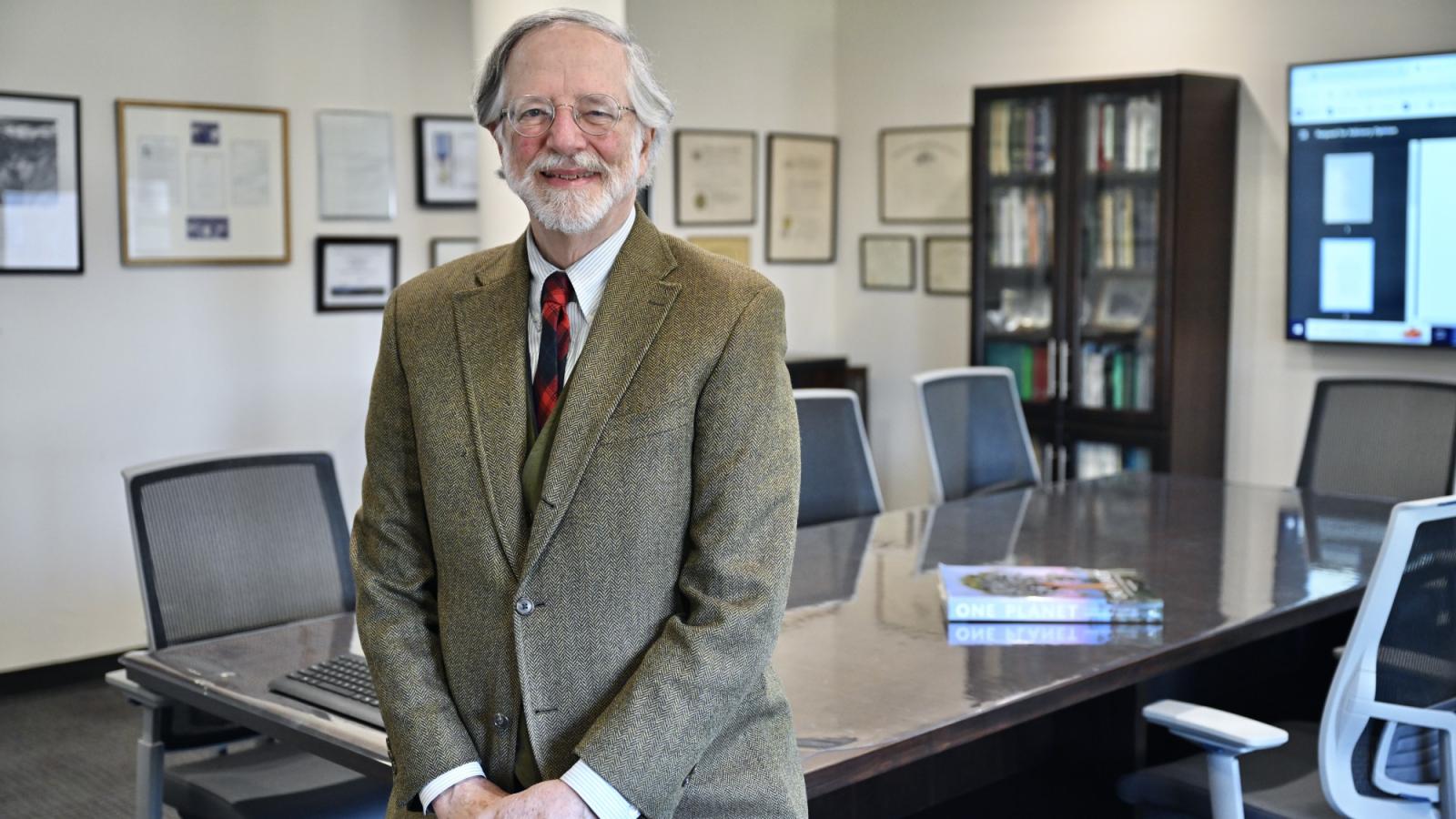
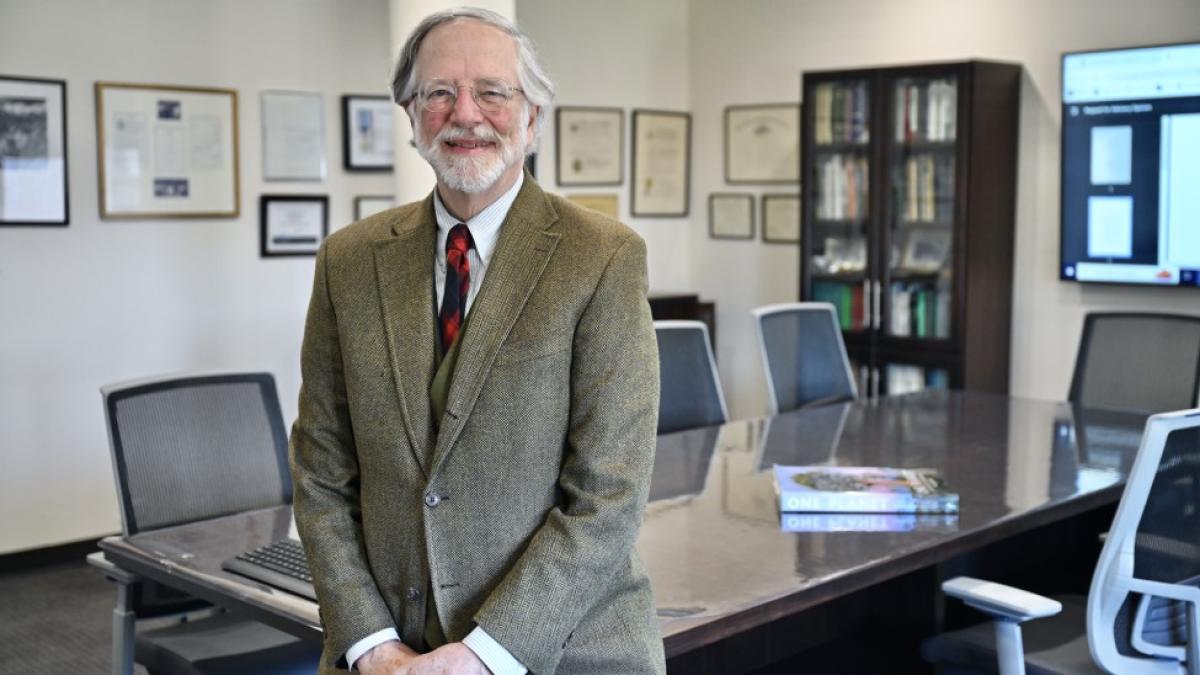
On March 22, 2024, friends and colleagues gathered together in person and virtually from across the globe for the dedication of the Nicholas A. Robinson Seminar Space at the Elisabeth Haub School of Law at Pace University, a room dedicated to preserving and presenting decades of scholarship and legal resources from Professor Nicholas A. Robinson, a pioneer in the field of Environmental Law.
Located on the 4th floor of Preston Hall, the Nicholas A. Robinson Seminar Space houses a vast collection of Professor Robinson’s published work and showcases many achievements and accolades spanning over his distinguished career of almost 50 years at the Law School. Original artwork in the new space includes a collage portrait by artist Geoffrey Stein and an oil painting commissioned by alumnus Justice Jawad Hassad, introducing future students to Professor Robinson’s life and legacy.
“The Nicholas A. Robinson Seminar Space is a place where Professor Robinson’s knowledge will not only be stored, but shared – creating a dedicated space for our students to learn and study,” said Horace E. Anderson, Dean of the Elisabeth Haub School of Law. “It is Professor Robinson’s vision to utilize the new space for guest lectures, seminars and important discourse centered around environmental law and policy, inspiring others to follow in his footsteps.”
Following remarks from Dean Horace Anderson and Pace University President Marvin Krislov, Professor Robinson was presented with a video including messages from friends, colleagues and alumni around the world, who have all been inspired by his work. In addition, he received a plaque from colleague Professor Wang Xi of Shanghai Jiao Tong University, Kunming University of Science and Technology and Wuhan University in China, and a poem from Gus Speth, Co-Founder of the Natural Resources Defense Council and Founder and President of the World Resources Institute, commemorating the special occasion.
Professor Nicholas A. Robinson is University Professor on the Environment and Gilbert and Sarah Kerlin Distinguished Professor of Environmental Law Emeritus at Haub Law, and has been a member of the faculty since 1978.
Professor Robinson is widely recognized in the U.S. and globally as a pioneer of modern environmental law. He began developing environmental law in 1969, when he was named to the Legal Advisory Committee of the President’s Council on Environmental Quality. During his career, he drafted New York’s wetlands and wild bird laws and was inaugurated as the first chairman of both the statutory Freshwater Wetlands Appeals Board and Greenway Heritage Conservancy for the Hudson River Valley. He edited the proceedings of the 1992 United Nations Earth Summit in Rio de Janeiro, Brazil.
Professor Robinson is Chair Emeritus of the IUCN World Commission on Environment Law, serving from 1996 to 2004, and responsible for many innovations including the launch of the IUCN Academy of Environmental Law. He has engaged in drafting treaties and counseling different countries on preparation of environmental laws.
During his tenure at the Law School, Professor Robinson helped establish its environmental law programs, founded the environmental law review, launched the Pace Environmental Law Clinic, secured Pace’s membership in the International Union for the Conservation of Nature (IUCN), and pioneered the first United Nation’s Environmental Diplomacy Practicum. His work and influence can be attributed to advancing the Law School’s premiere reputation as the top ranked Environmental Law Program in the nation and across the globe.
Professor Robinson is a prolific legal scholar with hundreds of books, chapters, law review and scholarly journal articles and citations to his credit. The new Nicholas A. Robinson Seminar Space will house a curated collection of this work, making it available to students, alumni, and scholars engaged in research.
Student-run businesses. Real life learning.
Every year, students in Pace’s Lubin School of Business generate an impressive $650K in revenue through student-run businesses. That's learning for the real world.
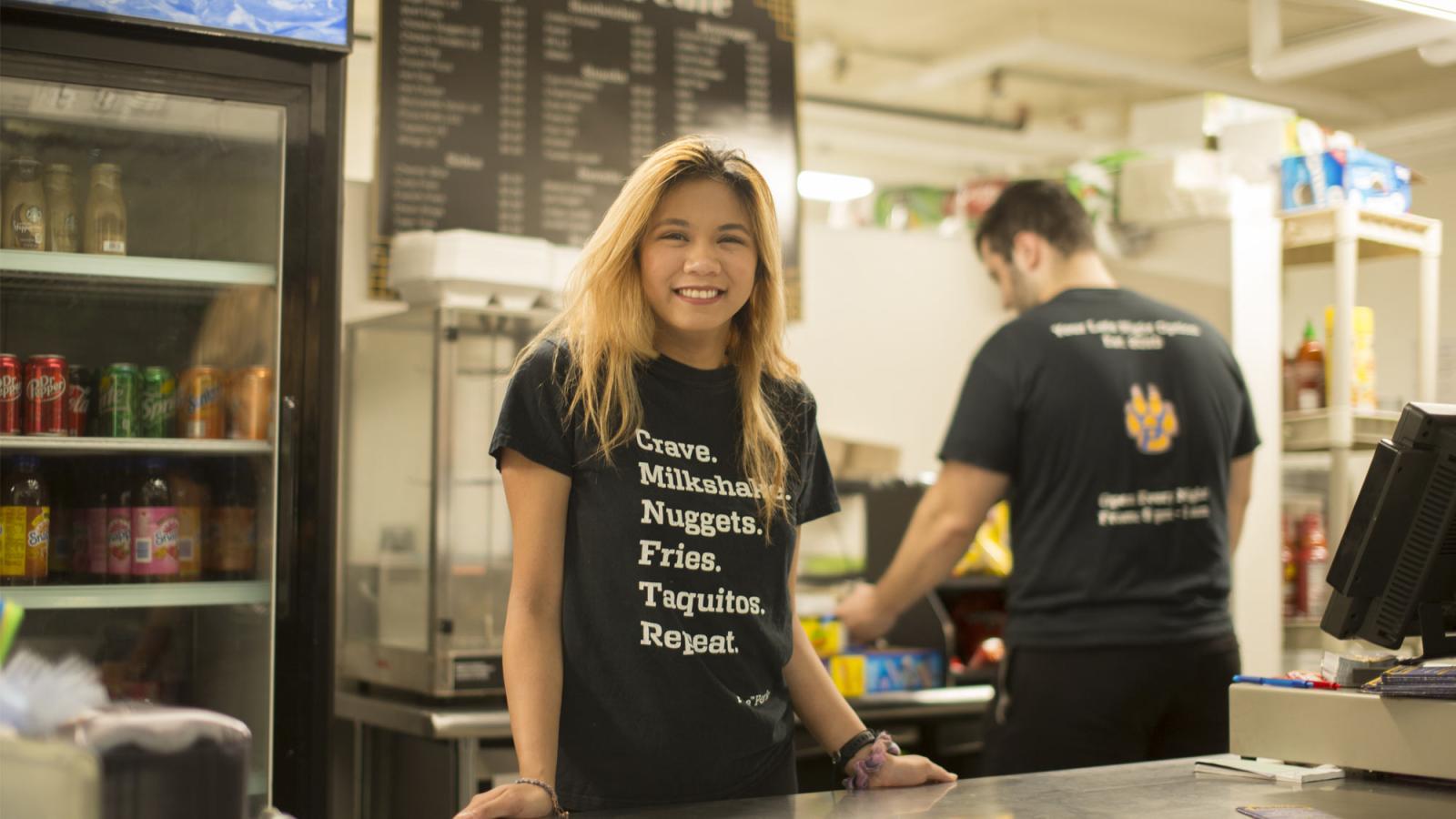

At the Center for Student Enterprise (CSE) within the Lubin School of Business, Pace students are busy at work. They’re not just doing homework; they’re employed at and managing five different student-run businesses on the Pleasantville Campus.
More than 65 students work at the businesses. Xavier Flores ‘25, Business Management BBA and Marketing Management MBA, is one of those who has loved his experiences with the companies.
“I first got involved with CSE in the fall of my first year,” he said. “I applied right after orientation and was hired at Pace Delivers as a driver. By the end of my first year, I was promoted to General Manager.” Pace Delivers, founded in 2017, provides food delivery to students from local restaurants.
Xavier continued, “Going into the Spring 2024 semester I will be the General Manager of Pace Perk. When I first started, I had so many questions about how the business operated, and over the past three years, I have been able to answer all the questions I had.”
Working as the General Manager of Pace Delivers gave Xavier an opportunity to learn skills he might not have otherwise picked up from his classes. He says that attending board meetings improved his public speaking skills, helping the marketing manager gave him experience with Canva, Excel, and Instagram, and collaborating with the CFO gave him experience with QuickBooks. “I have learned and gained as much as I could through my time spent at CSE, but I will use all of these skills. I think it will give me a leg up going into my career because being part of and managing a student-run business is something that very few college students get the opportunity to do,” he said.
“My experience working for Pace Mart has been truly a blessing,” says Pace Mart Senior Marketing Manager and Lubin BBA student Joseph Ingles ’25. “My hard skills and soft skills have enhanced greatly. Running a business like Pace Mart, sometimes things come up out of nowhere and you just have to adapt to the situation at hand. That experience has made me stronger and prepared for what is to come.”
Maggie Glynn is another student who can testify to how working at a student-run business has impacted her experience at Pace. Maggie ‘26, Public Accounting BBA and MBA, is the Chief Financial Officer of Pace Fit, the healthy snack bar located in Goldstein Fitness Center. “I have gained so much real-world experience from the CSE,” Maggie says. “I was drawn to Pace for the internship opportunities, but little did I know I would gain a deeper understanding of the workforce and what I want my role to be from working on campus. Working at Pace Fit allowed me to get real-world accounting experience as a sophomore. I learned what I love about the profession and where I can see myself continuing after graduating.”
She adds that she has gained invaluable technical and soft skills between managing a team, problem solving, and handling finances, “I learned how to prepare, analyze, and present financial statements for board meetings. I learned the value of communication, compromise, and leadership.” Maggie insists, “This continues to be a skill that sets me apart from other candidates when interviewing for accounting internships.”
All of the student managers tell me that when they go for interviews for internships or full-time jobs that all the interviewer wants to ask them about is their position at the student-run business.
Kathryn Winsted, PhD, is the director of the Center for Student Enterprise. She has a deep understanding of how experiential learning enhances what students do in the classroom and helps them discover what really matters in the world of business. Winsted has acted as the advisor to all five of the student-run businesses since they first opened in 2010, and has helped students succeed through different challenges, including COVID-19. Throughout the years, she has seen students thrive in their roles and launch into careers they feel passionate about.
“All of the student managers tell me that when they go for interviews for internships or full-time jobs that all the interviewer wants to ask them about is their position at the student-run business,” Winsted said. “My favorite story is when the student who was one of the original founders of Pace Mart went for an interview at J.P. Morgan, she was able to answer the situational questions with real experiences she had at the business she was running. She was hired on the spot.”
Beyond seeing students find success in their careers, Winsted knows that the students “learn so much more in their courses when they use it in running the businesses and bring that practical experience to their learning.” She hopes that they learn beyond classroom concepts as well, saying that there are many opportunities to practice handling conflict and problem solving, aiding them in becoming adaptable and finding self-motivation.
Both Xavier and Maggie said that they would recommend interested students to get involved. “If any Lubin students are hesitant about joining a student-run business, do it!” Maggie shared.
More from Pace
Meet Cyber Range: Pace’s new, state-of-the-art facility designed to give students a collaborative, practical immersion in tackling real-life cybersecurity threats, all in real-time.
Pace student and UN Millennium Fellow Lucie Belle Flagg ’24 channeled both her frustrations and her energy into bringing greater awareness of hidden disabilities to the Pace Community. Through her collaborative work, she’s helped make Pace the first university in New York to officially launch the Hidden Disabilities Sunflower program.
The Honorable Margaret M. deGuzman Delivers 2024 Blaine Sloan Lecture on International Law
Professor and Judge Margaret M. deGuzman delivered the 2024 Blaine Sloan Lecture on International Law on Wednesday, March 20, speaking on "The Promise and Perils of International Criminal Law.” The Blaine Sloan Lecture on International Law honors F. Blaine Sloan for developing the international law studies program at Pace. The Honorable Margaret M. deGuzman is James E. Beasley Professor of Law and Co-Director of the Institute for International Law and Public Policy at Temple Law School. She is also a judge of the Residual Mechanism for International Criminal Tribunals, where she currently serves on the Trial Chamber for The Prosecutor v. Félicien Kabuga.
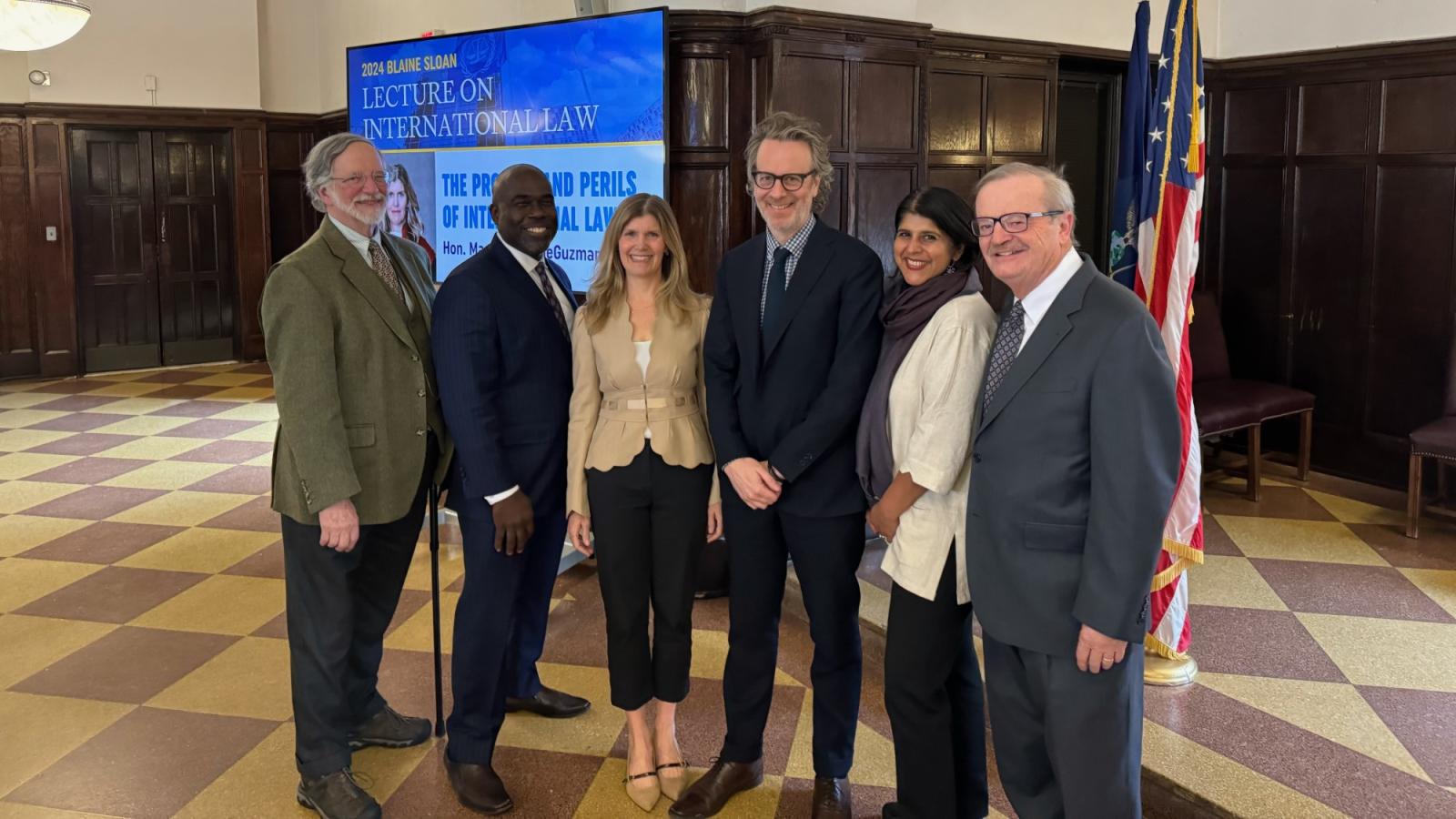
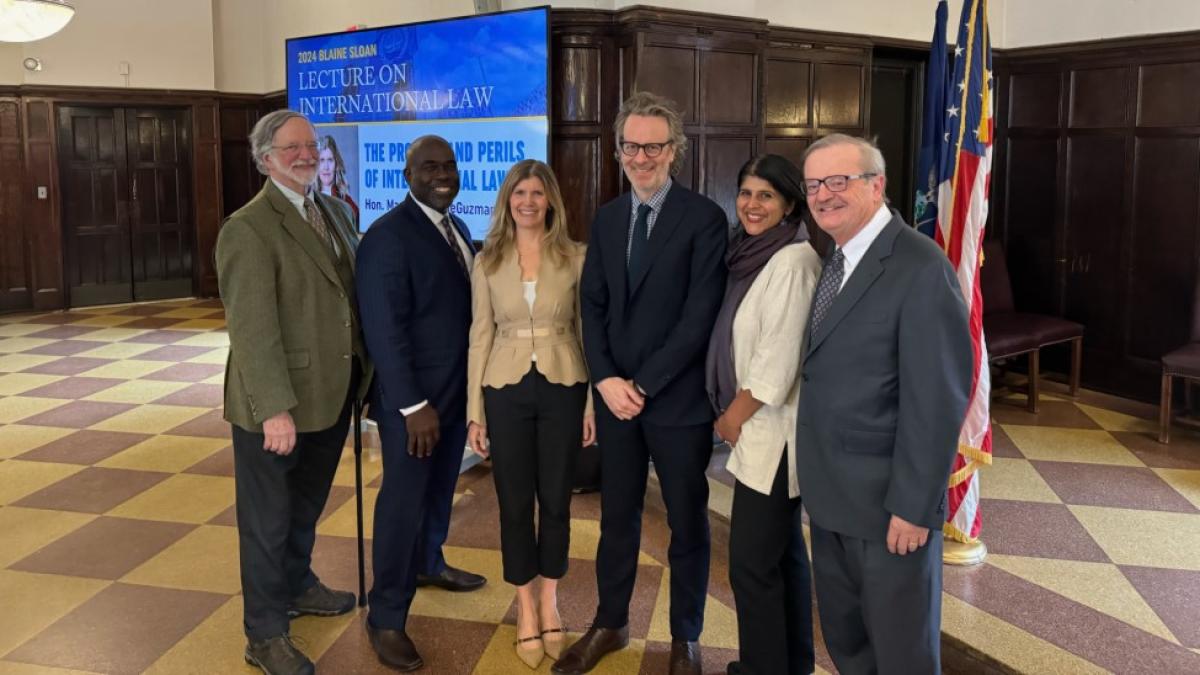
Professor and Judge Margaret M. deGuzman delivered the 2024 Blaine Sloan Lecture on International Law on Wednesday, March 20, speaking on "The Promise and Perils of International Criminal Law.” The Blaine Sloan Lecture on International Law honors F. Blaine Sloan for developing the international law studies program at Pace. The Honorable Margaret M. deGuzman is James E. Beasley Professor of Law and Co-Director of the Institute for International Law and Public Policy at Temple Law School. She is also a judge of the Residual Mechanism for International Criminal Tribunals, where she currently serves on the Trial Chamber for The Prosecutor v. Félicien Kabuga.
Following welcome remarks from Elisabeth Haub School of Law Dean Horace E. Anderson Jr., Elisabeth Haub School of Law at Pace University Professor Alexander K.A. Greenawalt had the pleasure of introducing the Honorable Professor deGuzman. Professor deGuzman began her lecture by noting that “International Criminal Law (ICL) has been one of the fastest growing areas of international law over the past several decades and has garnered a huge amount of attention even more so since Russia invaded Ukraine a couple of years ago. It has been in the news constantly. And so, I think it is particularly important to think about whether it merits all of the attention and all of the resources it is receiving.”
During her insightful lecture, Professor deGuzman started with a brief overview of ICL and how it can be broadly defined. She stated that ICL can be defined “as a set of institutions, laws, rules, and norms designed to regulate certain kinds of conduct.” She notes that although the kinds of conduct included in the scope of that regulation are themselves important subjects of debate, for purposes of her lecture, she limited the subject to what are often referred to as atrocity crimes: war crimes, crimes against humanity, genocide, and the crime of aggression. “These are crimes that at least arguably and some of the time concern the international community as a whole so they merit the attention, the resources, and the institutions of international criminal law.”
After giving a brief overview of ICL, the topics it covers, the institutions, and a brief history, Professor deGuzman discussed the “promise of ICL” or the ways in which ICL has the potential to contribute to a more just international or global society. Throughout her lecture, she gave real world examples of how ICL and the International Criminal Court function. From there, she noted some of the perils of ICL as opposed to the previously discussed promise and the ways in which ICL has the potential to harm the global community and its members.
Professor deGuzman concluded her fascinating talk with a discussion of where she sees the future of the international criminal field heading. She noted her optimistic outlook and feelings that “the promise of ICL outweighs the perils” and that she believes “some global criminal justice is better than the alternative.” She acknowledged the need for reform in some capacity. “I think we need to do more to embrace alternative justice mechanisms and bring those into the scope of what the global community thinks about in the context of mass atrocity crimes. We need to fight harder against the unfairness that comes from the imbalances of political power and the inequalities that creates. ICL should be part of a bespoke approach to justice at the global level. By engaging in that process together with all of the different actors in the process, including civil society, academics, government actors as well as the actors in the institutions themselves, we will co-create a global justice system that ultimately holds a lot of promise to do good in the world.”
Professor deGuzman’s research areas include international criminal law, international humanitarian law, international human rights law, and transitional justice. Her scholarship examines the role of international criminal law in the global legal order. Her publications include Shocking the Conscience of Humanity: Gravity and the Legitimacy of International Criminal Law (Oxford University Press 2020), The Elgar Companion to the International Criminal Court (with Valerie Oosterveld eds., Edward Elgar Publishing 2020), and Arcs of Global Justice: Essays in Honour of William A. Schabas (with Diane Marie Amann eds., Oxford University Press 2018). Her work has appeared in numerous other books and journals, including the Journal of Criminal Law and Philosophy, Virginia Journal of International Law, and Yale Journal of International Law. Professor deGuzman is a Senior Peace Fellow at the Public International Law and Policy Group, a consultant with Global Rights Compliance, a board member of the Center for International Law and Policy in Africa, and she serves on the editorial board of the African Journal of International Criminal Justice.
Before joining the Temple Law faculty, Professor deGuzman clerked on the Ninth Circuit Court of Appeals and practiced law in San Francisco, specializing in criminal defense. She served as a legal advisor to the Senegal delegation at the Rome Conference on the ICC and as a law clerk in the Office of the Prosecutor of the International Criminal Tribunal for Former Yugoslavia. She was a Fulbright Scholar in Darou Ndiar, Senegal.
Following the lecture, law students, faculty and guests had an opportunity to ask questions during a Q&A session led by Professor Greenawalt. Questions from audience members ranged from topics such as the relationship between the International Court of Justice and the International Criminal Court, questions on ecocide, and more. Following the Q&A there was a reception where audience members had a chance to meet Professor deGuzman.
The Blaine Sloan Lecture on International Law honors F. Blaine Sloan for developing the international law studies program at Pace. A member of the United Nations Legal Office for three decades and Director of the General Legal Division, Professor Sloan has contributed significantly to the development of private and public international law. He represented the Secretary General at the 1978 UN Conference on the Carriage of Goods by Sea; at the sessions from 1969–1978 of the UN Commission on International Trade Law (UNCITRAL); and at the 1966–1978 sessions of the Legal Sub-Committee on the Peaceful uses of Outer Space. His UN service involved him in that organization’s work on Vietnam, relief for Palestinian refugees, peacekeeping in the Middle East, the UN Commission on Korea, and as Legal Advisor to Security Council sessions in Africa and Latin America. Past Sloan lectures were delivered by various distinguished experts and academics in the field of International Law, including Benjamin B. Ferencz, Shoshana Netanyahu, Dr. Boris Kozolchyk, Professor Sarah Cleveland, and others.
Pace Women's Justice Center Executive Director Cindy Kanusher, Esq. Named to City & State's Inaugural "Trailblazers in Law" List
The Pace Women's Justice Center (PWJC) is proud to announce that its esteemed Executive Director, Cindy Kanusher, Esq., has been selected for inclusion on City & State’s inaugural "Trailblazers in Law" list. The Trailblazers in Law award spotlights attorneys, academics, public officials, and other influential figures who have made an impact in the legal field in New York.
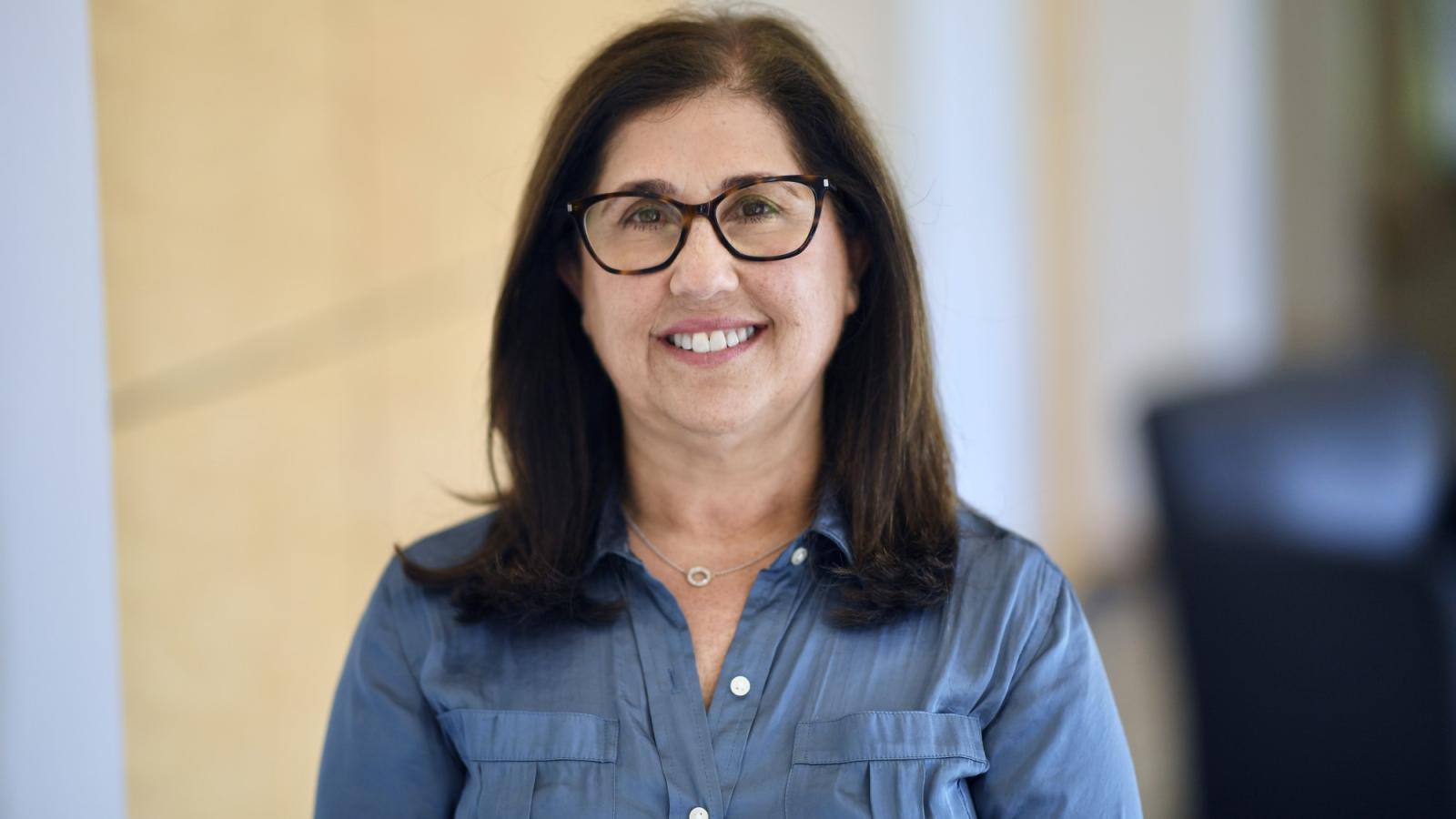
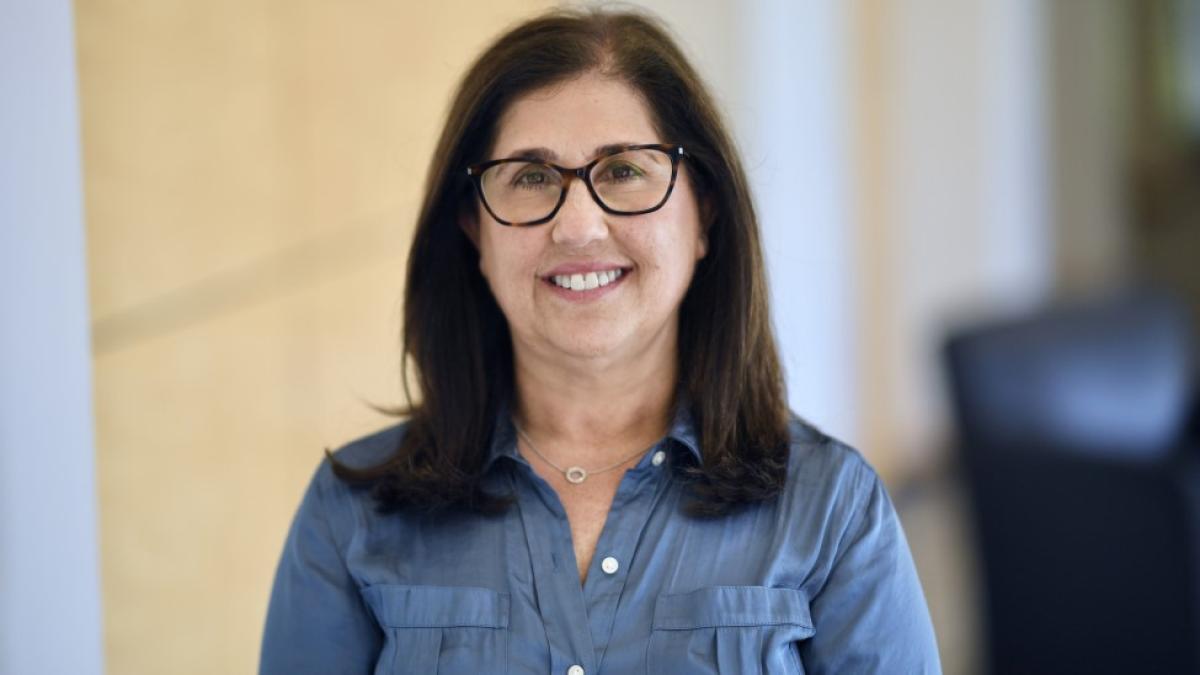
The Pace Women's Justice Center (PWJC) is proud to announce that its esteemed Executive Director, Cindy Kanusher, Esq., has been selected for inclusion on City & State’s inaugural "Trailblazers in Law" list. The Trailblazers in Law award spotlights attorneys, academics, public officials, and other influential figures who have made an impact in the legal field in New York.
With over 25 years of dedicated service to PWJC, Cindy Kanusher has demonstrated unwavering commitment and exceptional leadership in advocating for victims and survivors of abuse as well as providing representation to the underrepresented. Throughout her illustrious career, Cindy has been instrumental in shaping PWJC's mission and vision. During her tenure, PWJC has grown into a highly respected, multi-faceted legal services and training center serving over 3000 victims and survivors of interpersonal violence annually, providing invaluable legal assistance to those in need and tirelessly championing the cause of justice.
Shortly after becoming PWJC’s Executive Director, Cindy identified a need for a more flexible service model and developed the idea of a walk-in clinic that provides free, bilingual legal services to victims of domestic violence, sexual assault, and elder abuse, in a safe and non-threatening location. She was also integral in spearheading fundraising efforts to build a brand-new clinic and office space for PWJC, which allowed increased services. Cindy’s leadership has empowered survivors to navigate the legal system with confidence and obtain the support they need to rebuild their lives. Cindy recently accepted the Visionary of Justice Award at Elisabeth Haub School of Law at Pace University’s 29th annual Law Leadership Awards Dinner.
About Pace Women's Justice Center
The Pace Women’s Justice Center (PWJC) is a self-funded nonprofit legal center located at Elisabeth Haub School of Law, under the 501(c)(3) status of Pace University. Each year, PWJC provides free legal services to over 3,500 victims and survivors of domestic violence, sexual assault, and elder abuse, as well as conducts or participates in over 140 training and outreach events. Serving Westchester and Putnam Counties, PWJC’s mission is to pursue justice for victims and prevent abuse through quality legal services, community partnerships, education, and awareness. With an experienced staff and a team of dedicated volunteers, including attorneys, other professionals, and students, PWJC has built an effective, coordinated community response to interpersonal violence.
Can A New Relationship Survive Mismatched Texting Styles?
Dyson Professor Leora Trub provides expert insights to The Age Australia on the potential challenges that arise when individuals in new relationships have different texting styles.
"Absolutely Shocking": Experts Worry "Astonishing" Delay Could Derail Trump's NY Trial Entirely
Professor Gershman speaks to Salon.com about a New York judge delaying the start of Donald Trump's New York hush-money trial by 30 days to at least mid-April to allow the former president's legal team to parse through a massive batch of newly disclosed evidence.

